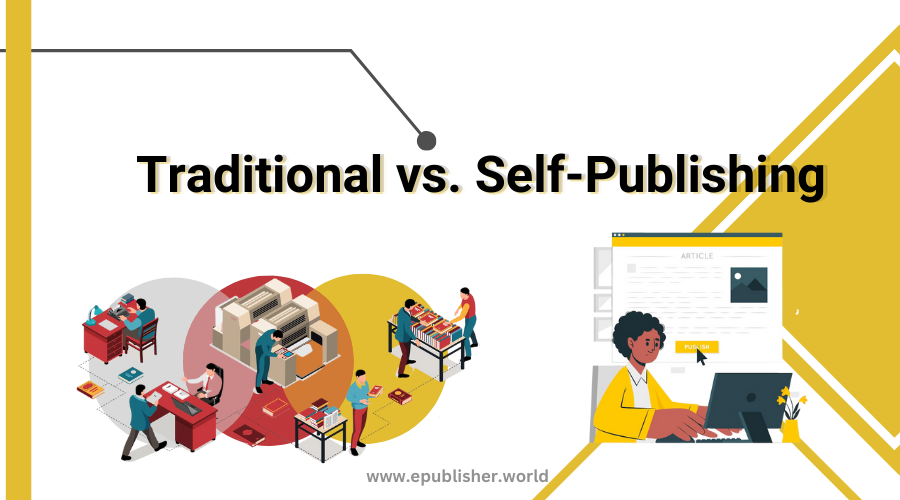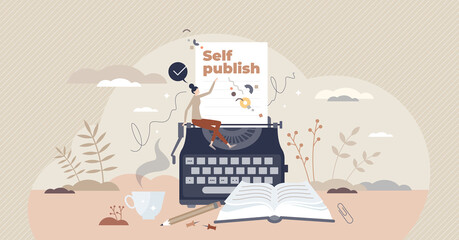
Traditional vs Self-Publishing
Welcome to Epublisher’s guide to Traditional vs Self-Publishing. In this article, we’ll explore the pros and cons of both publishing methods, and help you determine which is right for your book. We’ll look at the cost, time, and process involved with each approach, and provide you with the information and resources you need to make an informed decision. So let’s dive in and explore the differences between Traditional and Self-Publishing.
What Is Traditional Publishing?
Traditional publishing is a form of publishing that has been around since the development of the printing press. It is a process that involves a publisher acquiring the rights to a book from an author and then taking on the responsibility of producing, distributing, and marketing the book.
Traditional publishing has many benefits for authors, including access to professional editing and marketing services, as well as the potential for larger returns on sales. While authors may have to wait for months or even years for their book to be accepted for publication, traditional publishers have the resources and expertise to ensure the book is of a high quality and reaches a wide audience.

In traditional publishing, authors usually enter into a contract with the publisher, agreeing to pay an advance against the book’s royalties and granting the publisher the exclusive rights to publish the book. These rights are typically exclusive and long-term, meaning the publisher is the only source of the book and has complete control over its production and distribution.
This process also involves extensive editing and revision. The publisher will typically hire professional editors to review the manuscript, make suggestions and changes, and craft the final version of the book. This process often takes months to complete and is an important part of the traditional publishing process.
Once the book is complete, the publisher will typically take on the responsibility of marketing it. This may involve creating promotional materials, advertising campaigns, and arranging for reviews, book signings, and other events. Depending on the publisher, there may also be options for e-book publishing and other digital formats.
Finally, the publisher has the responsibility of distributing the book to retailers and libraries, and managing the book’s distribution and sales. For authors, this ensures the book is available to readers and potential customers, and helps them maximize the potential of their work.
Traditional publishing is a complex process, but for many authors, it is the best way to ensure their work reaches a wide audience. It is also a great way to benefit from professional editing and marketing services, as well as the potential for larger returns on sales.
3 Benefits of Traditional Publishing
The publishing industry has evolved significantly over the years, and with the emergence of self-publishing, it has become easier than ever to get your work out into the world. However, traditional publishing still has its advantages and can be the right choice for many professional authors. Here are three benefits of traditional publishing that should be considered.
1. Professional Editing and Formatting: One of the main advantages of traditional publishing is the professional editing and formatting that you get. Your work will be edited and formatted to a high standard by experienced editors, ensuring that it is of the highest quality and ready for publication. This level of attention will help to elevate your work and make it stand out in the competitive publishing market.
2. Increased Visibility: Traditional publishing generally leads to greater visibility and higher book sales than self-publishing. This is because traditional publishing houses have strong networks and resources that can help to promote your book and get it into the hands of potential readers.
3. Quality Control: With traditional publishing, you can rest assured that your book will meet the quality standards of the publishing house. The publisher will have a rigorous selection process to ensure that only the best quality books make it into print. This means you can be certain that your book will be produced to a high standard and reflect the quality of your work.
Traditional publishing can be a great way for authors to get their work out into the world and increase its visibility. It can offer a range of benefits, including professional editing and formatting, increased visibility, and quality control. For professional authors looking to make the most of their work, it can be an ideal choice.
What Is Self-Publishing?

Self-publishing is a process by which authors are able to produce, promote and sell their work without the need for a traditional publishing house. It is a relatively new phenomenon that has been made possible thanks to technology and the internet, and it allows authors to retain control over every element of the book’s production, from editing and design to distribution and marketing.
Self-publishing has become increasingly popular in recent years and is becoming a viable option for authors who are unable to secure a publishing contract. There are a number of ways to self-publish, including traditional print publishing and digital book publishing. Each has its own unique set of pros and cons, and it is up to the author to decide which is best for them.
When self-publishing, authors are responsible for all aspects of the process. This includes finding a printer, designing a cover, formatting the interior of the book, writing sales copy, and marketing the book. Authors must also consider the cost of self-publishing, as they will be responsible for paying all associated expenses, including printing and binding costs.
Self-published authors also have to consider the ways in which they will distribute their book. They have the option of selling their book in physical stores, through websites, or through digital bookstores such as Amazon. They can also choose to make their book available for free to readers.
The benefit of self-publishing is that authors can set their own price and retain control over every element of the book’s production. It also provides authors with a greater degree of freedom and flexibility. However, it is important to note that self-publishing requires a great deal of effort and dedication. Authors must be prepared to devote the necessary time and resources to the project, as well as to the marketing and promotion of the book.
Self-publishing can be a great way for authors to gain a following and make a name for themselves in the publishing industry. However, it is important to be aware of the risks involved and to do your research before beginning the process. With the right approach, self-publishing can be a successful and rewarding venture.
3 Benefits of Self-Publishing
The popularity of self-publishing has skyrocketed in recent years, and with good reason. Self-publishing offers a range of benefits for authors looking for a creative and cost-effective way to get their work out into the world. Here are three key benefits of self-publishing:
1. Control: Self-publishing gives authors full control over the publishing process. From the design and layout of the book to the pricing and marketing, authors have complete control over their project. This also means that authors can respond quickly to changes in the market, allowing them to get their work out to readers faster.
2. Cost: Self-publishing can be significantly more affordable than traditional publishing. Authors don’t have to pay an advance, and they have more control over the pricing of their book. This can be a huge benefit for authors who are on a tight budget.
3. Reach: Self-publishing gives authors the opportunity to reach a much wider range of readers than traditional publishing. With self-publishing, authors can make their work available to readers around the world with the click of a button. This can be especially beneficial for authors who are looking to build a global audience for their work.
Self-publishing offers authors a unique opportunity to share their work with a global audience in a cost-effective and creative way. By taking advantage of the control, cost-savings, and reach that self-publishing offers, authors can maximize their potential and find success in the publishing world.
